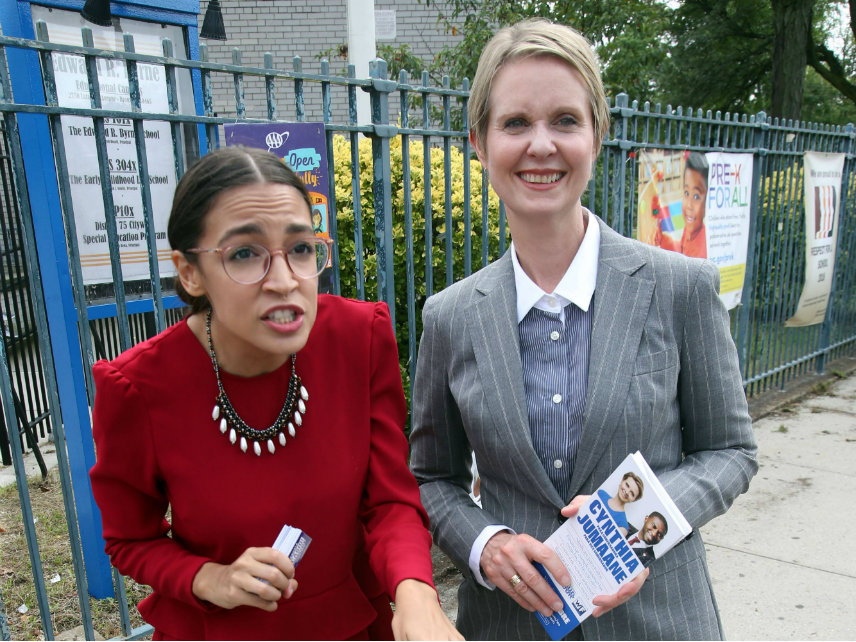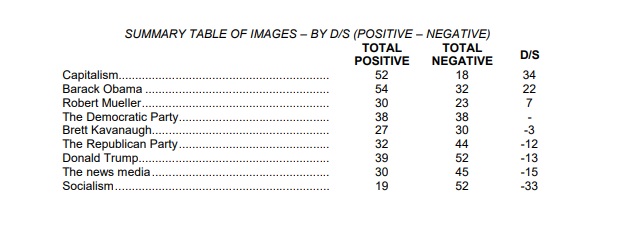Sorry, Socialists: Capitalism Still Polls Way Better Than Politics
One has generated more wealth for more people than any other system ever tried, while the other has produced a long track record of failure, misery, and death.

It hasn't exactly been the best year for capitalism.
Self-professed socialists (or "democratic socialists") are winning primary elections and promising massive new entitlement programs on the left, while free trade is under attack and tariffs are back in vogue on the right. On Twitter, #LateStageCapitalism has become a catch-all, post-post-ironic criticism for things that seem just a little too superflouous—supposedly revealing the essential flaws of a system that critics see as valuing stuff above all else.
Despite enjoying a growing economy, low unemployment, and a standard of living that was out of reach for the upper middle class just a few decades ago, Americans of every socioeconomic stratum seem more disgruntled than ever.
Zoom out, though, and capitalism is still doing pretty good.
An NBC/Wall Street Journal poll conducted last week found that capitalism is viewed favorably by 52 percent of registered voters, while a mere 18 percent of voters have an unfavorable view of it. That's almost the exact opposite of how Americans view socialism, with only 19 percent of voters in the poll saying they have a favorable view of socialism, compared with 52 who view it unfavorably.
But capitalism vs. socialism is almost an unfair fight. One system has generated more wealth for more people than any other economic system ever tried by human beings, while the other has produced a long track record of failed states, famines, economic catastrophes, and human misery almost without comparison. I mean, it's actually kind of impressive that socialism polls as well as it does.
But it turns out that Americans like capitalism better than—well, anything related to politics.
From the poll:

The aggregate numbers do hide part of the story. Democrats are far more likely to have a favorable view of socialism—33 percent, versus just six percent of Republicans who feel the same way. And the NBC/Wall Street Journal poll did not include cross-tabs based on the age of respondents. If they did, their poll might reflect what others have shown, which is that young people are far more likely to favor socialism. Some recent polls show that as many as 50 percent of 18-29 year-olds holding favorable views of it.
But even under the rosiest set of scenarios, it's clear that a socialist revolution is not about to sweep across America. As The Wall Street Journal's Joshua Jamerson notes in his assessment of the poll results, the real capitalism/socialism divide is not between the right and the left of American politics, but rather between factions of the Democratic Party. Democrats who feel good about socialism are generally white, educated, and urban, while those opposed to it are generally older and more racially diverse.
Political victories for people like Alexandria Ocasio-Cortez might help "normalize the s-word" in American politics, but it remains difficult to see the democratic socialists' "moment" as being more than an internecine fight on the left—the type of thing that happens when one political party has suffered a string of national defeats (see: Tea Party, 2010, Republicans).
More importantly, capitalism isn't going anywhere.
Sure, it's not perfect—systems operated by human beings never are. But we shouldn't be surprised that voters have a higher opinion of an economic system that generally makes things cheaper and more plentiful, especially when contrasted against the crapstorm of contemporary politics.


Show Comments (99)